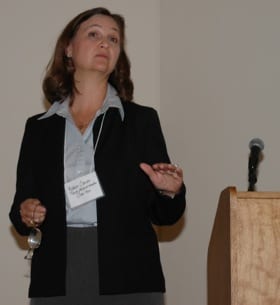Who is a member?
Our members are the local governments of Massachusetts and their elected and appointed leadership.
 On Sept. 10 in Worcester, roughly 200 local officials took part in a state-sponsored regionalization conference, an event that highlighted an array of projects cities and towns have launched during the past year to reduce costs.
On Sept. 10 in Worcester, roughly 200 local officials took part in a state-sponsored regionalization conference, an event that highlighted an array of projects cities and towns have launched during the past year to reduce costs.
“Our economy in this state is driven regionally,” said Lt. Gov. Tim Murray during the event’s opening session. “Our municipal governments play a very important role in that economy.”
Murray announced that another $4 million in Community Innovation Challenge grants will be available in fiscal 2013 to support local government innovations through regional collaborations. The $4 million that was distributed last spring among roughly 30 projects will benefit almost half of the state’s cities and towns, Murray said, because many of the projects are regional in scope.
Metropolitan Area Planning Commission Executive Director Marc Draisen, who also spoke during the opening session, lauded local officials for their willingness to adopt new approaches.
“We have the opportunity to make these programs a regular part of the Massachusetts landscape,” Draisen said. “In order to do that, and, more importantly, in order to better serve our constituents, we need to ask all of you, and we need to ask state leaders, to have an increased attention, an increased focus, and frankly, to take some risks that may be difficult to take.”
The conference featured 10 workshops covering topics such as collaborative energy efforts, regional public health districts, and a project in southeastern Massachusetts to create an online, region-wide permitting system for fire departments. A workshop with speakers from New Jersey and New York discussed efforts to merge some towns in those two states.
Charlton Town Administrator Robin Craver outlined the work of the Central Massachusetts Regional Stormwater Coalition, formed to help area communities comply with U.S. Environmental Protection Agency regulations for storm sewer systems. Every community is required to update its Municipal Separate Storm Sewer System permit, known as MS4, every five years.
In addition to Charlton, the regional coalition includes Auburn, Dudley, Holden, Leicester, Millbury, Oxford, Paxton, Shrewsbury, Spencer, Sturbridge, Webster and West Boylston. The coalition has developed a three-part plan consisting of regionalizing data management; standardizing policies and procedures; and collaborating on education and training.
Craver said the coalition decided early on that “if we’re going to do this, it’s important that we make it transferable, so that other communities are able to use it.”
She added, “If we had to do all this ourselves, the cost would be astronomical.”
The coalition received a $310,000 Community Innovation Challenge grant last March to help it create a data management tool that would aid in complying with the MS4 rules.
Acton Public Health Director Doug Halley discussed a project, also involving Boxborough, Littleton, Maynard and Stow, to regionalize van service for the benefit of seniors and commuters who come from the Boston area and need transit from commuter-rail stations to jobs in the five towns. The project received a grant of $185,000 to help create a dispatching center serving all five communities.
Halley identified one of the challenges: “How do we transition to central dispatching without disrupting our current services?”
Officials from Brookfield discussed an equipment-sharing cooperative involving four neighboring towns.
The regionalization conference was sponsored by the Department of Revenue’s Division of Local Services, the Franklin Regional Council of Governments, and the Massachusetts Association of Regional Planning Agencies.